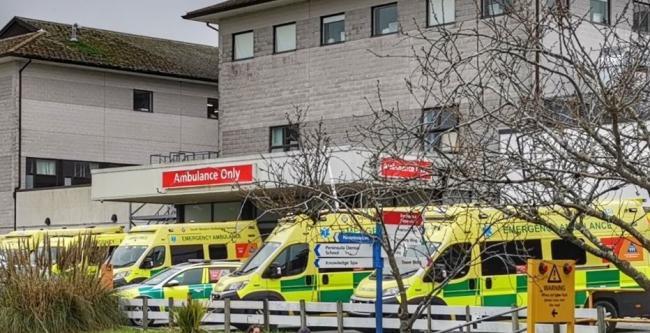A Continued surge in demand across health and care services has prompted a plea from help from the people of Cornwall.
Kim O’Keeffe, acting chief executive at the Royal Cornwall Hospitals NHS Trust and Matthew Patrick, chief executive of Cornwall Partnership NHS Foundation Trust say the health and care system in Cornwall and the Isles of Scilly and the wider southwest is experiencing an unrelenting surge in demand as it responds to the current phase of the COVID-19 pandemic, as well as delivering its core activities (many of which were stood down during 2020).
As a result, more unwell people are coming forward for care and treatment.
Emergency ambulance callouts in Cornwall were 23% higher in July than in the same month in 2019, before the pandemic.
There also between 160 and 180 patients in hospital who are well enough to go home but awaiting care packages.
A complex mix of factors is contributing to our current situation, the NHS bosses are asking residents and visitors to help us throughout this summer by:
- Making use of pharmacies: Common conditions like urine infections, back pain which has flared up during the journey to Cornwall, sunburn, gout, and insect bites can all be treated by a pharmacist.
- Contacting their own GP: Residents or visitors should contact their own GP in normal surgery hours. Your own GP knows you best and can speak to you by telephone or online, wherever you are – although you may need to wait for an appointment.
- Talking before walking: Use NHS 111’s online symptom checker or call 111 for free, 24 hours a day, 7 days a week for non-emergency treatment before presenting at A&E, a minor injury unit or urgent care facility. 111 will direct you to the best health service for your health need. The 111 team can summon emergency assistance if you need it too.
- Calling the mental health support line on 0800 038 5300: Available 24 hours a day, 7 days a week the support line is there for anyone, of any age who is worried about their own or someone else’s mental health
- Downloading the HandiApp: The app provides advice about common childhood conditions. Most childhood fevers, and coughs can be treated with Calpol, and by drinking water, and will improve within a week. Call your GP or 111 if your child does not get better, or their condition worsens.
- Protecting our ambulance service and the NHS: Only call 999 in a genuine, life-threatening emergency, and please don’t call back asking for an arrival time.
- Collecting a relative from hospital: Picking someone up when they are ready for discharge and as early in the day as possible means we can admit someone who needs lifesaving care.
- Making use of the one-off discharge grant: A one-off grant of up to £1,200 is now available for people who are medically fit to leave hospital but need a bit of extra care and support in the short term to return home. The fund allows them to decide exactly what support they need and can be used for anything within reason, the person needs to help with their discharge and return home in the short-term, while waiting for assessment of their ongoing care needs.
- Always treating staff at surgeries, hospitals and in the community with respect: Our staff have been working without pause for the past 18 months to do the best they can for everyone, whether resident or visitor. This year is likely to be our busiest summer ever, with more people taking staycations because of vaccine confidence and uncertainty over foreign holidays. Thankfully, the number of people in hospital with COVID-19 is relatively low, although a significant number of people are being treated at home.
The NHS bosses said in a statement: "We are taking steps to manage this level of demand by actively recruiting to vacancies and bringing additional staff into Cornwall and Isles of Scilly. Supporting them with accommodation so they can start work quickly.
"Deploying clinicians from corporate services back to frontline patient care. Focussing resources to where we know they will be needed, for example diverting staff from small minor injury units to the larger and busier ones.
"Preparing for a further surge at the end of August, in babies and children with Respiratory Syncytial Virus or RSV. This is a common respiratory virus that usually causes mild, cold-like symptoms. While most children recover in a week or two, RSV can be serious for babies and children. We expect to see significant numbers of children and babies with this condition through until November.
"Putting in place arrangements for the COVID-19 booster and flu vaccination programme to protect our population. Supporting a national drive to reach holidaymakers before they leave home for Cornwall, so they bring the right medicines and know what NHS help is available if needed on their staycation.
"Our staff are working harder than ever, while managing the additional measures which are now part of our everyday approach to COVID-19. These include wearing and changing personal protective equipment, maintaining social distancing, and the enhanced cleaning of areas."




Recent comments
1 week 16 hours ago
36 weeks 4 days ago
38 weeks 2 days ago
38 weeks 2 days ago
48 weeks 20 hours ago
1 year 8 weeks ago
1 year 33 weeks ago
1 year 43 weeks ago
2 years 2 weeks ago
3 years 27 weeks ago